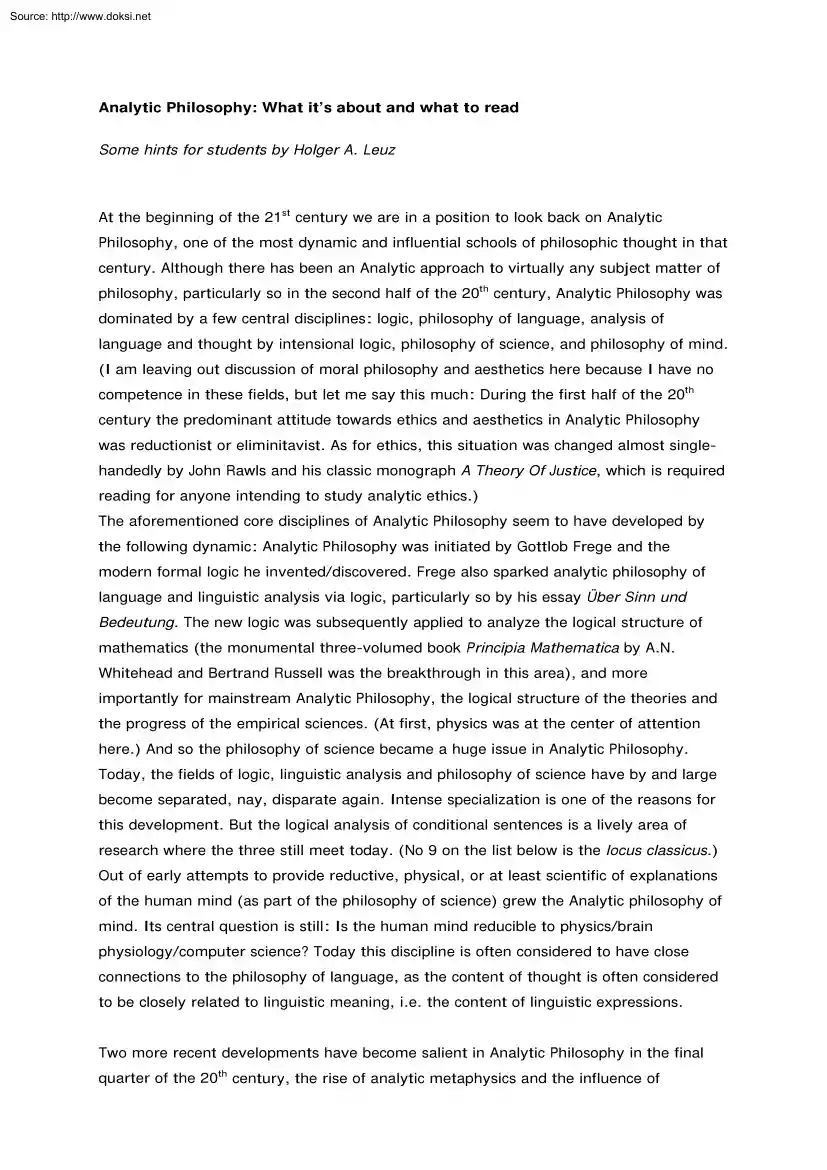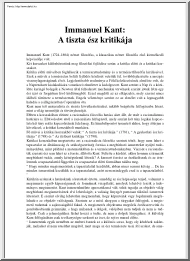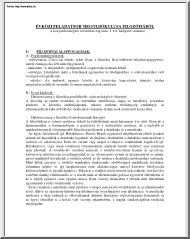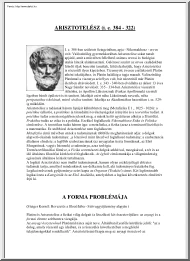Datasheet
Year, pagecount:2009, 3 page(s)
Language:English
Downloads:2
Uploaded:April 16, 2018
Size:463 KB
Institution:
-
Comments:
Attachment:-
Download in PDF:Please log in!
Comments
No comments yet. You can be the first!Most popular documents in this category
Content extract
Source: http://www.doksinet Analytic Philosophy: What it’s about and what to read Some hints for students by Holger A. Leuz At the beginning of the 21st century we are in a position to look back on Analytic Philosophy, one of the most dynamic and influential schools of philosophic thought in that century. Although there has been an Analytic approach to virtually any subject matter of philosophy, particularly so in the second half of the 20th century, Analytic Philosophy was dominated by a few central disciplines: logic, philosophy of language, analysis of language and thought by intensional logic, philosophy of science, and philosophy of mind. (I am leaving out discussion of moral philosophy and aesthetics here because I have no competence in these fields, but let me say this much: During the first half of the 20th century the predominant attitude towards ethics and aesthetics in Analytic Philosophy was reductionist or eliminitavist. As for ethics, this situation was changed almost
singlehandedly by John Rawls and his classic monograph A Theory Of Justice, which is required reading for anyone intending to study analytic ethics.) The aforementioned core disciplines of Analytic Philosophy seem to have developed by the following dynamic: Analytic Philosophy was initiated by Gottlob Frege and the modern formal logic he invented/discovered. Frege also sparked analytic philosophy of language and linguistic analysis via logic, particularly so by his essay Über Sinn und Bedeutung. The new logic was subsequently applied to analyze the logical structure of mathematics (the monumental three-volumed book Principia Mathematica by A.N Whitehead and Bertrand Russell was the breakthrough in this area), and more importantly for mainstream Analytic Philosophy, the logical structure of the theories and the progress of the empirical sciences. (At first, physics was at the center of attention here.) And so the philosophy of science became a huge issue in Analytic Philosophy Today,
the fields of logic, linguistic analysis and philosophy of science have by and large become separated, nay, disparate again. Intense specialization is one of the reasons for this development. But the logical analysis of conditional sentences is a lively area of research where the three still meet today. (No 9 on the list below is the locus classicus) Out of early attempts to provide reductive, physical, or at least scientific of explanations of the human mind (as part of the philosophy of science) grew the Analytic philosophy of mind. Its central question is still: Is the human mind reducible to physics/brain physiology/computer science? Today this discipline is often considered to have close connections to the philosophy of language, as the content of thought is often considered to be closely related to linguistic meaning, i.e the content of linguistic expressions Two more recent developments have become salient in Analytic Philosophy in the final quarter of the 20th century, the rise
of analytic metaphysics and the influence of Source: http://www.doksinet American Pragmatism. The Analytic Philosophy of the first half of the 20th century is often described as zealously anti-metaphysical. I believe this judgement is true to the letter, although I think the central metaphysical tenet in the days from Carnap to Quine was really that science, and above all, physics was the best metaphysics. During the sixties this attitude became less predominant mainly through the influence of David Lewis and Saul Kripke. Important and representative books in analytic metaphysics are David Lewis‘ On the plurality of worlds and D.M Armstrong’s A world of states-of-affairs, but the metaphysical community is usually very much focussed on research papers in journals. The development of analytic metaphysics was initiated by Quine’s short paper On what there is. The influence of Pragmatism (the philosophy of Charles S Peirce, William James and John Dewey) was also mediated by Quine
(who is the most important Analytic philosopher of the 20th century, in my personal opinion). An influential book in contemporary Analytic-Pragmatist thought is No 11 on the list below. Although it may be too early to tell, Robert Brandom’s monograph Making It Explicit seems to have become something of a classic work of contemporary Analytic-Pragmatist thought. Brandom also acknowledges the importance of a continental thinker who is often considered a philosophus non gratus in Analytic Philosophy: Hegel. As is evident from the typical subject matters Analytic Philosophy deals with, it is usually concerned with developing analyses of and solutions to philosophical problems. This is done by careful, often formal-logical, analysis of philosophical tenets and arguments, and by methodical thinking and the weighing of evidence. Clarity and precision are considered inexpendable virtues. The exegesis of important thinkers and their classic works is usually seen rather as a means than as an
end of philosophical activity. But beyond that, Analytic Philosophy has become a very diverse philosophical movement, and the great diversity of subject matters dictates a diversity of methods and approaches. Today, Analytic Philosophy may best be characterized not by a common method or common tenets, but by a common tradition, which was initiated by Gottlob Frege, Bertrand Russell and G.E Moore And finally, here is a list of classic books (and two essays) of that Analytic tradition which I would like to recommend to any student intending to get acquainted with the subject on a deeper level. Source: http://www.doksinet Essential readings in Analytic Philosophy 1. Gottlob Frege: Über Sinn und Bedeutung Bertrand Russell: On Denoting (both are essays) 2. Bertrand Russell: Human Knowledge: Its Scope and Limits 3. Ludwig Wittgenstein: Philosophische Untersuchungen 4. Rudolf Carnap: Meaning and Necessity 5. Gilbert Ryle: The Concept of Mind 6. CG Hempel: Aspects of Scientific Explanation
7. WV Quine: Word and Object 8. Saul Kripke: Naming and Necessity 9. David Lewis: Counterfactuals 10. Paul Grice: Studies in the Way of Words 11. Hilary Putnam: Reason, Truth and History 12. Bas Van Fraassen: The Scientific Image 13. David Chalmers: The Conscious Mind In addition, any deeper understanding of the many formal and technical aspects discussed in Analytic Philosophy requires that the student acquires skills in basic predicate logic (as taught in standard introductory logic courses for philosophy students), some knowledge of modal logic and possible worlds semantics, and some knowledge of basic set theory. There are numerous good textbooks on these subjects. An entirely subjective recommendation of mine is this quartet (the first three books are well-tested seminal textbooks, though): - W.V Quine: Methods of Logic (dt Grundzüge der Logik) - Hughes / Cresswell: A New Introduction to Modal Logic - Paul Halmos: Naive Set Theory (dt. Naive Mengenlehre) - Robert Stoll:
Set Theory and Logic
singlehandedly by John Rawls and his classic monograph A Theory Of Justice, which is required reading for anyone intending to study analytic ethics.) The aforementioned core disciplines of Analytic Philosophy seem to have developed by the following dynamic: Analytic Philosophy was initiated by Gottlob Frege and the modern formal logic he invented/discovered. Frege also sparked analytic philosophy of language and linguistic analysis via logic, particularly so by his essay Über Sinn und Bedeutung. The new logic was subsequently applied to analyze the logical structure of mathematics (the monumental three-volumed book Principia Mathematica by A.N Whitehead and Bertrand Russell was the breakthrough in this area), and more importantly for mainstream Analytic Philosophy, the logical structure of the theories and the progress of the empirical sciences. (At first, physics was at the center of attention here.) And so the philosophy of science became a huge issue in Analytic Philosophy Today,
the fields of logic, linguistic analysis and philosophy of science have by and large become separated, nay, disparate again. Intense specialization is one of the reasons for this development. But the logical analysis of conditional sentences is a lively area of research where the three still meet today. (No 9 on the list below is the locus classicus) Out of early attempts to provide reductive, physical, or at least scientific of explanations of the human mind (as part of the philosophy of science) grew the Analytic philosophy of mind. Its central question is still: Is the human mind reducible to physics/brain physiology/computer science? Today this discipline is often considered to have close connections to the philosophy of language, as the content of thought is often considered to be closely related to linguistic meaning, i.e the content of linguistic expressions Two more recent developments have become salient in Analytic Philosophy in the final quarter of the 20th century, the rise
of analytic metaphysics and the influence of Source: http://www.doksinet American Pragmatism. The Analytic Philosophy of the first half of the 20th century is often described as zealously anti-metaphysical. I believe this judgement is true to the letter, although I think the central metaphysical tenet in the days from Carnap to Quine was really that science, and above all, physics was the best metaphysics. During the sixties this attitude became less predominant mainly through the influence of David Lewis and Saul Kripke. Important and representative books in analytic metaphysics are David Lewis‘ On the plurality of worlds and D.M Armstrong’s A world of states-of-affairs, but the metaphysical community is usually very much focussed on research papers in journals. The development of analytic metaphysics was initiated by Quine’s short paper On what there is. The influence of Pragmatism (the philosophy of Charles S Peirce, William James and John Dewey) was also mediated by Quine
(who is the most important Analytic philosopher of the 20th century, in my personal opinion). An influential book in contemporary Analytic-Pragmatist thought is No 11 on the list below. Although it may be too early to tell, Robert Brandom’s monograph Making It Explicit seems to have become something of a classic work of contemporary Analytic-Pragmatist thought. Brandom also acknowledges the importance of a continental thinker who is often considered a philosophus non gratus in Analytic Philosophy: Hegel. As is evident from the typical subject matters Analytic Philosophy deals with, it is usually concerned with developing analyses of and solutions to philosophical problems. This is done by careful, often formal-logical, analysis of philosophical tenets and arguments, and by methodical thinking and the weighing of evidence. Clarity and precision are considered inexpendable virtues. The exegesis of important thinkers and their classic works is usually seen rather as a means than as an
end of philosophical activity. But beyond that, Analytic Philosophy has become a very diverse philosophical movement, and the great diversity of subject matters dictates a diversity of methods and approaches. Today, Analytic Philosophy may best be characterized not by a common method or common tenets, but by a common tradition, which was initiated by Gottlob Frege, Bertrand Russell and G.E Moore And finally, here is a list of classic books (and two essays) of that Analytic tradition which I would like to recommend to any student intending to get acquainted with the subject on a deeper level. Source: http://www.doksinet Essential readings in Analytic Philosophy 1. Gottlob Frege: Über Sinn und Bedeutung Bertrand Russell: On Denoting (both are essays) 2. Bertrand Russell: Human Knowledge: Its Scope and Limits 3. Ludwig Wittgenstein: Philosophische Untersuchungen 4. Rudolf Carnap: Meaning and Necessity 5. Gilbert Ryle: The Concept of Mind 6. CG Hempel: Aspects of Scientific Explanation
7. WV Quine: Word and Object 8. Saul Kripke: Naming and Necessity 9. David Lewis: Counterfactuals 10. Paul Grice: Studies in the Way of Words 11. Hilary Putnam: Reason, Truth and History 12. Bas Van Fraassen: The Scientific Image 13. David Chalmers: The Conscious Mind In addition, any deeper understanding of the many formal and technical aspects discussed in Analytic Philosophy requires that the student acquires skills in basic predicate logic (as taught in standard introductory logic courses for philosophy students), some knowledge of modal logic and possible worlds semantics, and some knowledge of basic set theory. There are numerous good textbooks on these subjects. An entirely subjective recommendation of mine is this quartet (the first three books are well-tested seminal textbooks, though): - W.V Quine: Methods of Logic (dt Grundzüge der Logik) - Hughes / Cresswell: A New Introduction to Modal Logic - Paul Halmos: Naive Set Theory (dt. Naive Mengenlehre) - Robert Stoll:
Set Theory and Logic





 Just like you draw up a plan when you’re going to war, building a house, or even going on vacation, you need to draw up a plan for your business. This tutorial will help you to clearly see where you are and make it possible to understand where you’re going.
Just like you draw up a plan when you’re going to war, building a house, or even going on vacation, you need to draw up a plan for your business. This tutorial will help you to clearly see where you are and make it possible to understand where you’re going.